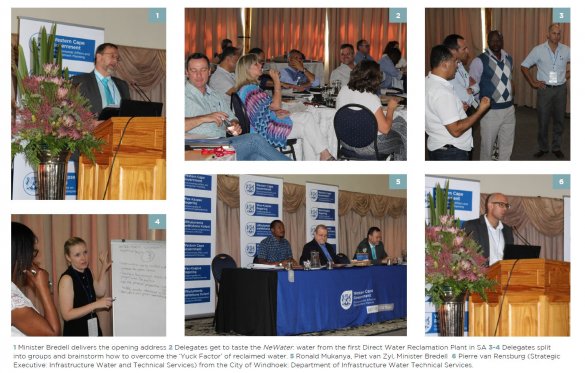The 4th successful Western Cape Sustainable Settlement Innovation Summit (SSIS 2017) was recently held on 20 and 21 February 2017 at Goudini Spa in Rawsonville, Worcester.
A key focus of this year’s summit was on the Western Cape’s Water System, water reuse and how water is recognised as a central plank of the green economy. The summit explored bankablewater security projects from leading global and local examples.
Key speakers included international representatives from the City of Windhoek, who presented their case study on how they have been practising direct potable reuse (DPR) for more than 45 years. Recent UN reports estimate that about half of the global population could be facing water shortages by 2030. This has led to an increased focus on existing water sources and what could be done to maximize its potential in water reuse. MEC Bredell, who delivered the opening address, said: “Extreme weather conditions such as the drought, affects food security and economic growth. Government must take a proactive approach by working together with all sectors and all citizens to address our water security issues.”
Another key focus of the conference was on using the “power of council”, based on successful local and international municipal/public policies and examples, to facilitate climate-resilient infrastructures which lead to increased water saving and water security measures.
Challenging the delegates taste buds and mindsets of direct potable reuse, Pierre Marais of Water and Wastewater Engineering presented the successful ‘local is lekker’ case of Beaufort West (and South Africa’s) first water reclamation plant. Delegates got to taste the first potable water from sewage.
The session aimed to provoke and inspire, whilst suggesting that the implications of initiatives like this for other Western Cape municipalities are possible. The session also highlighted a realistic way forward on Direct Water Reclamation Plants. Other topics of discussion that took place was the financing and operation of water security infrastructure (including location, design, and construction) and how this will have profound impacts on the Western Cape’s resilience to climate change. This discussion explored how the green economy, from a water sector perspective, will effectively assist in achieving the provincial development and job creation objectives as outlined in the Provincial Strategic Goals (PSGs). In an effort of guiding implementation by all role players, the summit aimed to identify opportunities of bankable water security projects and emerging examples of good practice that can be replicated in the Western Cape.
In closing, Ronald Mukanya, Director of Sustainability, said: “The Summit programme was rich in opportunities for information sharing and engagement on both local and international scale and highlighted working experiences from practitioners, government officials and other experts. This has shown us the opportunities that can be harnessed so that we can work better together in addressing water security for all in the Western Cape and South Africa.”

